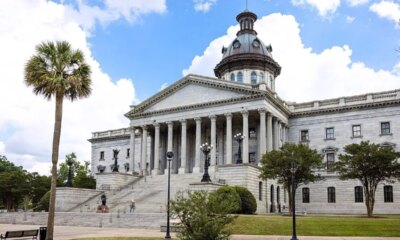Pennsylvania
What’s the status of abortion access in Pennsylvania?

This story originally appeared on Spotlight PA.
Abortion is legal in Pennsylvania. And with a Democratic governor in power who supports access, it will almost certainly remain so for at least the next three years.
But that doesn’t mean it’s as easy to get an abortion in the commonwealth as supporters want it to be.
It also doesn’t mean that attempts to restrict the procedure are dead. Less than two years ago, Republican lawmakers launched a robust attempt to enshrine language in the state constitution that would have said there was no right to abortion. While the legislature has since changed significantly, many members who supported the effort are still in office.
With new federal abortion laws not forthcoming post-Roe v. Wade, and decisions about access still firmly in states’ hands, here’s a primer on where abortion policy stands in Pennsylvania.
What is Pennsylvania’s abortion law?
Pregnancies can be ended in the commonwealth up to 24 weeks gestation, a deadline tied to the concept of viability that was introduced in 1973’s Roe v. Wade. Abortions can be performed after that cutoff if a pregnant person’s life or health is in danger.
Pennsylvania doesn’t have language on its books protecting the right to an abortion, unlike many other states. For instance, voters in California, Michigan, and Vermont in 2022 enshrined guarantees of abortion rights in their state constitutions, which constrain future abortion-restricting bills unless those amendments are repealed.
Pennsylvania also imposes several other rules on people who wish to end pregnancies.
One of them is a requirement for pre-abortion counseling, followed by a 24-hour wait before the person can undergo the surgical procedure or obtain medication. Before a minor can get an abortion, their parent or guardian must also consent unless a judge signs off on a judicial bypass.
Other restrictions involve insurance coverage. Plans for public employees who are paid using state funds don’t cover abortion except in cases of rape, incest, or a life-endangering health condition. Medicaid coverage in the commonwealth includes the same caveats — as does coverage under plans in the Affordable Care Act exchange, unless the purchaser buys a rider for additional coverage.
These restrictions have long been opposed by organizations like Planned Parenthood. Signe Espinoza, who heads the group’s advocacy arm in Pennsylvania, said the commonwealth is “quite literally punishing poor people for not allowing them to use their own health care for life-saving care.”
There are, however, several organizations in the commonwealth that raise money to pay for abortion costs when insurance won’t. The state keeps a public list of these groups.
Some of Pennsylvania’s abortion restrictions stem from Planned Parenthood v. Casey, a landmark U.S. Supreme Court decision related to a law Pennsylvania passed in 1982.
The law imposed the parental consent requirement for minors to get abortions, the 24-hour waiting period, and a requirement that people seeking abortions get spousal consent. After the law was challenged on the basis that it ran afoul of Roe, the spousal consent provision was overturned.
Has the end of Roe affected Pennsylvania?
Since the U.S. Supreme Court overturned Roe v. Wade in 2022, 21 states have further tightened abortion restrictions. Fourteen have near-total bans and two have bans after six weeks, which is before many people know they’re pregnant. Five states now have 12- to 18-week bans.
Pennsylvania has not passed any additional restrictions. When Roe was overturned, the commonwealth was led by a Democratic governor who supported abortion access. It now has another Democratic governor, Josh Shapiro, who has been a similarly staunch opponent of restrictions, as well as a narrow Democratic state House majority whose leaders have taken the same stance.
Pennsylvania is one of 22 states that use roughly the same, viability-influenced cutoff for abortions under most circumstances. Seven states and Washington, D.C. place no gestational limit on the procedure, but the landscape could shift as state courts rule on the issue and legislatures pass new laws and turn over members.
In 2022, the most recent year for which there is complete data, 34,838 abortions were performed in Pennsylvania, of which 22,104 were performed at eight weeks or less of gestation.
The commonwealth’s Planned Parenthood chapter projects significant demand increases for Pennsylvania as other states continue to ban or restrict the procedure, though for now West Virginia is the only neighboring state with a total ban.
Will Pennsylvania ban abortion or further change access?
One big question mark remaining about abortion access in Pennsylvania has to do with the law that mostly keeps the procedure from being covered under Medicaid.
In 2019, abortion providers sued the state, arguing that the ban — which only excludes cases of rape, incest, and serious health risk — violates the state constitution’s equal protection provisions and Equal Rights Amendment.
The case has been working its way through the courts and is now before the Pennsylvania Supreme Court, which heard oral arguments in 2022 and could rule at any time.
The other abortion-related action currently happening in the commonwealth is likewise mostly geared toward expanding access.
Until recently, the commonwealth’s legislature was fully controlled by Republicans. Under that status quo, abortion-restricting legislation came up frequently. Perhaps most significantly, the body began moving an amendment in 2022 that would enshrine language in the state constitution that explicitly says abortion is not a protected right.
The move would tie the state Supreme Court’s hands and prevent judges from ruling any abortion-restricting legislation unconstitutional.

Pennsylvania
Pennsylvania Lottery Mega Millions, Pick 2 Day results for Feb. 27, 2026
The Pennsylvania Lottery offers several draw games for those aiming to win big.
Here’s a look at Friday, Feb. 27, 2026 results for each game:
Winning Mega Millions numbers from Feb. 27 drawing
11-18-39-43-67, Mega Ball: 23
Check Mega Millions payouts and previous drawings here.
Winning Pick 2 numbers from Feb. 27 drawing
Day: 4-7, Wild: 5
Evening: 8-8, Wild: 0
Check Pick 2 payouts and previous drawings here.
Winning Pick 3 numbers from Feb. 27 drawing
Day: 6-7-7, Wild: 5
Evening: 0-0-3, Wild: 0
Check Pick 3 payouts and previous drawings here.
Winning Pick 4 numbers from Feb. 27 drawing
Day: 7-2-1-4, Wild: 5
Evening: 5-7-3-1, Wild: 0
Check Pick 4 payouts and previous drawings here.
Winning Pick 5 numbers from Feb. 27 drawing
Day: 8-4-5-4-4, Wild: 5
Evening: 1-1-9-8-7, Wild: 0
Check Pick 5 payouts and previous drawings here.
Winning Cash 5 numbers from Feb. 27 drawing
04-14-16-20-38
Check Cash 5 payouts and previous drawings here.
Winning Treasure Hunt numbers from Feb. 27 drawing
02-04-08-13-30
Check Treasure Hunt payouts and previous drawings here.
Winning Match 6 Lotto numbers from Feb. 27 drawing
10-12-23-31-33-46
Check Match 6 Lotto payouts and previous drawings here.
Winning Millionaire for Life numbers from Feb. 27 drawing
03-04-13-28-42, Bonus: 02
Check Millionaire for Life payouts and previous drawings here.
Feeling lucky? Explore the latest lottery news & results
Are you a winner? Here’s how to claim your lottery prize
- Sign the Ticket: Ensure your ticket has your signature, name, address and phone number on the back.
- Prizes up to $600: Claim at any PA Lottery retailer or by mail: Pennsylvania Lottery, ATTN: CLAIMS, PO BOX 8671, Harrisburg, PA 17105.
- Prizes from $600 to $2,500: Use a Claim Form to claim at a retailer or by mail: Pennsylvania Lottery, ATTN: CLAIMS, PO BOX 8671, Harrisburg, PA 17105.
- Prizes over $2,500: Mail your signed ticket with a Claim Form or in person at a Lottery Area Office (9 a.m. to 4 p.m.).
Lottery Headquarters is currently not open to the public. Visit the PA Lottery website for other office locations near you.
When are the Pennsylvania Lottery drawings held?
- Powerball: 10:59 p.m. Monday, Wednesday and Saturday.
- Mega Millions: 11 p.m. Tuesday and Friday.
- Pick 2, 3, 4, 5: 1:35 p.m. and 6:59 p.m. daily.
- Cash4Life: 9 p.m. daily.
- Millionaire for Life: 11:15 p.m. daily
- Cash 5: 6:59 p.m. daily.
- Treasure Hunt: 1:35 p.m. daily.
- Match 6 Lotto: 6:59 p.m. Monday and Thursday.
- Powerball Double Play: 10:59 p.m. Monday, Wednesday, Saturday.
This results page was generated automatically using information from TinBu and a template written and reviewed by a Pennsylvania editor. You can send feedback using this form.
Pennsylvania
Affordable Housing Centers of Pennsylvania Helps Homeowners Protect Their Investment Across Generations » NCRC

For the past 17 years, the Affordable Housing Centers of Pennsylvania (AHCOPA) has provided a range of programs designed to build wealth within low- and moderate-income (LMI) communities. AHCOPA provides services to approximately 3,000 people each year via their pre-purchase, post-purchase and mortgage prevention counseling programs.
When Kenneth Bigos joined AHCOPA as their Executive Director in 2013, he set out to expand the organization’s offerings beyond first-time homeownership counseling services. He identified estate planning as an urgent need for the region’s LMI communities as well.
A 2022 Consumer Reports survey found that 77% of Black and 82% of Hispanic Americans do not have a will in place, which is needed to ensure that their home investment continues to build generational wealth. Consequently, the state court steps in upon the owner’s passing to decide how assets will be distributed, with property not being able to be transferred to an heir until that lengthy process is complete. In Philadelphia alone, there are approximately 10,000 properties with titles that have not been legally settled.
In response to this, AHCOPA launched the Will Power program in 2022 by leveraging existing relationships with pro-bono lawyers in the creation of wills and trusts for community members. The program has created an opportunity to serve a larger portion of Philadelphia’s population.
While the first-time homebuyer program initially attracted people in their mid-30s, Will Power participants are generally in their late 60s, prompting AHCOPA to think about what housing support looks like across an individual’s lifetime.
“Elderly households are more vulnerable,” Bigos said. “To reach these homeowners, we had to develop relationships with trusted agencies, such as senior centers, churches and other institutions that we would not typically work with in our first-time homebuyer program.”
As a result of that work, AHCOPA marked a major milestone in October 2025: the signing of 1,000 wills. Thanks to the success of Will Power and the first-time homebuyer program, AHCOPA has solidified its reputation as the go-to financial advisor for working-class residents.
Looking ahead, they are planning to add a new program designed to support people beyond the initial purchase of their home, which will include coaching to help owners develop their financial literacy. This would encompass how to build savings to buy a first home and avoid foreclosure in the event of a crisis.
For Bigos, NCRC membership is key to ensuring the success of these programs, especially in terms of organizing at the federal, state and local levels advocating for continued funding.
“Engaging with decision makers is very important and being an NCRC member has helped facilitate those relationships,” Bigos said. “Their support has been very impactful.”
Jesse Rhodes is a Contributing Writer.
Photo courtesy of the AHCOPA team.
Pennsylvania
How gambling revenue helps Pennsylvania fire departments

It is hard to imagine that money spent and collected at casinos and in slot machines around the state can wind up being used at local volunteer fire departments throughout the commonwealth, but it’s true.
In Pennsylvania, a portion of the state’s gaming revenue is allocated to support fire departments and emergency management services to the tune of about $30 million each year.
Departments can apply for those funds through a series of state grants, and most departments say that the money from gaming is vital to help them pay for equipment, vehicles and even improvements to their buildings.
“This time we put in for a grant to finish our second floor of our facility here,” said Derry Township Fire Chief Mark Piantine.
Piantine says that gambling revenue has purchased many things for his department in the past like swift water rescue boats as well as a new equipment washing station. Now he hopes that money can give his company a place to sleep when they are working long shifts in bad weather.
“The last storm we had, the Snowmageddon here a couple of weeks ago, we had people staying overnight,” Piantine said. “They were laying across the seats of the trucks and on the floor sleeping because our second floor is not finished.”
Piantine says every little bit helps both their department and other departments, because when it comes right down to it, running a fire department is expensive.
“When you buy a regular pair of gloves, you may pay $25 for them. We buy a pair of gloves, they’re $75 to $100,” said Piantine. “You can buy a pair of boots for $50, ours cost $600.”
Just a few miles away, in the city of Latrobe, Chief John Brasile says that while the city does a lot for them financially, gaming revenue helps a lot. It even helps them make payments on their rescue unit.
“We have about a year’s worth of payments left on it,” Brasile said. “And we use our money for debt reductions on that truck.”
“And that’s essentially from gambling revenue?” Chris DeRose asked.
“Yes. It comes from the State Fire Commissioners’ Office,” Brasile said.
“When is that truck paid off?” DeRose asked.
“About this time next year,” Brasile replied. “And then we can use that money for other stuff then. We would like to get new rescue tools for that truck and they’re expensive.”
The fire departments KDKA has spoken with about using state grant money from gambling revenue say that gambling money is great, but it is not a cure-all. And in fact, on Thursday night, the Latrobe Fire Department was holding yet another fundraising event to help them once again raise money for new fire equipment.
-

 World2 days ago
World2 days agoExclusive: DeepSeek withholds latest AI model from US chipmakers including Nvidia, sources say
-

 Massachusetts3 days ago
Massachusetts3 days agoMother and daughter injured in Taunton house explosion
-

 Montana1 week ago
Montana1 week ago2026 MHSA Montana Wrestling State Championship Brackets And Results – FloWrestling
-

 Louisiana5 days ago
Louisiana5 days agoWildfire near Gum Swamp Road in Livingston Parish now under control; more than 200 acres burned
-

 Denver, CO3 days ago
Denver, CO3 days ago10 acres charred, 5 injured in Thornton grass fire, evacuation orders lifted
-

 Technology1 week ago
Technology1 week agoYouTube TV billing scam emails are hitting inboxes
-

 Technology1 week ago
Technology1 week agoStellantis is in a crisis of its own making
-

 Politics1 week ago
Politics1 week agoOpenAI didn’t contact police despite employees flagging mass shooter’s concerning chatbot interactions: REPORT

























